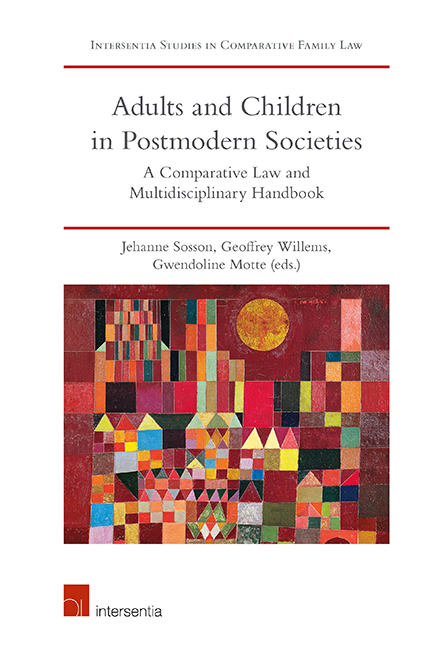Book contents
- Frontmatter
- Contents
- List of Cases
- List of Contributors
- Introduction
- PART I NATIONAL REPORTS ON LEGAL REGULATIONS OF RELATIONSHIPS BETWEEN ADULTS AND CHILDREN
- Questionnaire
- Models
- Algeria
- Argentina
- Australia
- Belgium
- Canada
- Democratic Republic of the Congo
- England and Wales
- France
- Germany
- Ireland
- Italy
- Japan
- The Netherlands
- Romania
- Spain and Catalonia
- Sweden
- Switzerland
- United States of America
- PART II INTERDISCIPLINARY APPROACH
- PART III INTERNATIONAL LAW INSIGHTS
- PART IV COMPARATIVE APPROACH
- General Conclusion: The Challenge of Transparent and Inclusive Parenthood/Parentality in a Pluralist and Cosmopolitan Context
- About the Editors
Models
from PART I - NATIONAL REPORTS ON LEGAL REGULATIONS OF RELATIONSHIPS BETWEEN ADULTS AND CHILDREN
Published online by Cambridge University Press: 26 June 2019
- Frontmatter
- Contents
- List of Cases
- List of Contributors
- Introduction
- PART I NATIONAL REPORTS ON LEGAL REGULATIONS OF RELATIONSHIPS BETWEEN ADULTS AND CHILDREN
- Questionnaire
- Models
- Algeria
- Argentina
- Australia
- Belgium
- Canada
- Democratic Republic of the Congo
- England and Wales
- France
- Germany
- Ireland
- Italy
- Japan
- The Netherlands
- Romania
- Spain and Catalonia
- Sweden
- Switzerland
- United States of America
- PART II INTERDISCIPLINARY APPROACH
- PART III INTERNATIONAL LAW INSIGHTS
- PART IV COMPARATIVE APPROACH
- General Conclusion: The Challenge of Transparent and Inclusive Parenthood/Parentality in a Pluralist and Cosmopolitan Context
- About the Editors
Summary
The flexibility model
Legal parenthood has to remain the fundamental cornerstone of the legal regulation of adult-child relationships but should be more flexible and reflect the changes in family structures. This could mean, for example, that legal parenthood should be easier to challenge and to reallocate. This could also mean that legal parenthood should be open to homosexual couples and/or to more than two persons.
The diversification model
The law should develop existing alternatives or invent new alternatives to legal parenthood in order to reflect changes in families. This could mean, for example, that there should be another/some other legal status available beside legal parenthood such as a status of ’ genitor ‘or’ procreator ‘or’ social parent ’ that would be associated with a predefined range of rights and duties.
The diffraction model
The law should allow for a wide distribution of the specific rights and obligations traditionally associated with parenthood between several adults (parental responsibility, maintenance, contact rights and information, changing of names, inheritance, welfare benefits and tax law). This could mean, for example, that anyone should be allowed to make an application for parental responsibility, maintenance, contact and/or information in relation to a child, independently of any predefined status, and that the decision should depend on a casuistic balance of the (conflicting) interests at stake.
The hybrid model
A combination of a certain level of flexibility, diversification and diffraction is required to reflect the changes that occur in adult-child relationships in our postmodern societies. This would mean that none of the models proposed above is sufficient to react to the rapid evolution of family realities and that two models (at least) should be combined in order to reconstruct the legal regulation of relationships between adults and children.
- Type
- Chapter
- Information
- Adults and Children in Postmodern SocietiesA Comparative Law and Multidisciplinary Handbook, pp. 13 - 14Publisher: IntersentiaPrint publication year: 2019



